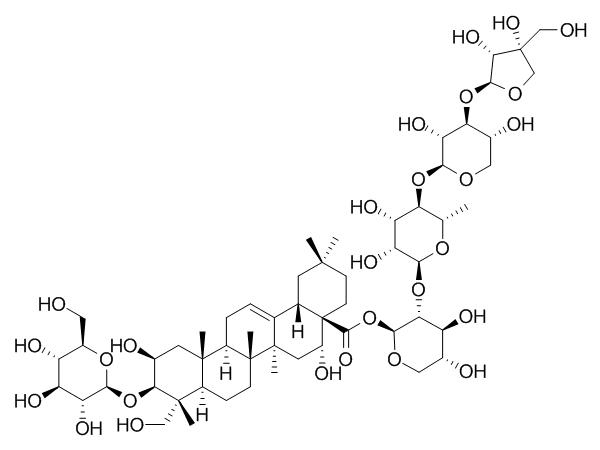Polygalacin D
Polygalacin D shows anti- proliferation, anti-inflammary, and hepatoprotective activities, it can inhibit the expression of lipopolysaccharide (LPS)-induced iNOS and COX-2 protein and mRNA without an appreciable cytotoxic effect on RAW 264.7 macrophages, and can suppress induction by LPS of pro-inflammatory cytokines such as prostaglandin E2 (PGE2).
Inquire / Order:
manager@chemfaces.com
Technical Inquiries:
service@chemfaces.com
Tel:
+86-27-84237783
Fax:
+86-27-84254680
Address:
1 Building, No. 83, CheCheng Rd., Wuhan Economic and Technological Development Zone, Wuhan, Hubei 430056, PRC
Providing storage is as stated on the product vial and the vial is kept tightly sealed, the product can be stored for up to
24 months(2-8C).
Wherever possible, you should prepare and use solutions on the same day. However, if you need to make up stock solutions in advance, we recommend that you store the solution as aliquots in tightly sealed vials at -20C. Generally, these will be useable for up to two weeks. Before use, and prior to opening the vial we recommend that you allow your product to equilibrate to room temperature for at least 1 hour.
Need more advice on solubility, usage and handling? Please email to: service@chemfaces.com
The packaging of the product may have turned upside down during transportation, resulting in the natural compounds adhering to the neck or cap of the vial. take the vial out of its packaging and gently shake to let the compounds fall to the bottom of the vial. for liquid products, centrifuge at 200-500 RPM to gather the liquid at the bottom of the vial. try to avoid loss or contamination during handling.
Int J Mol Sci.2021, 22(21):11447.
Environ Toxicol.2020, doi: 10.1002
Materials Today Communications2023, 37:107216
Antibiotics (Basel).2024, 14(1):8.
Korean J. Crop Sci.2018, 63(2):131-139
J Ethnopharmacol.2020, 269:113752.
J Ethnopharmacol.2018, 210:88-94
Invest New Drugs.2017, 35(2):166-179
Int J Mol Sci.2018, 19(2)
Biomolecules.2020, 10(2):E184
Related and Featured Products
Life Sci., 2005, 76(20):2315-28.
Inhibition of inducible nitric oxide synthase and cyclooxygenase II by Platycodon grandiflorum saponins via suppression of nuclear factor-kappaB activation in RAW 264.7 cells.[Pubmed:
15748625 ]
Saponins are glycosidic compounds present in many edible and inedible plants. They exhibit potent biological activities in mammalian systems, including several beneficial effects such as anti-inflammation and immunomodulation.
METHODS AND RESULTS:
In this study, we investigated the effects of seven platycodin saponins on the activities of inducible nitric oxide synthase (iNOS) and cyclooxygenase II (COX-2) in lipopolysaccharide (LPS)-induced RAW 264.7 macrophages. We found that 2"-O-acetyl Polygalacin D (S1), platycodin A (S2), platycodin D (S3), and Polygalacin D (S6) inhibited LPS-induced NO production in a concentration-dependent manner. Furthermore, these compounds inhibited the expression of LPS-induced iNOS and COX-2 protein and mRNA without an appreciable cytotoxic effect on RAW 264.7 macrophages, and could suppress induction by LPS of pro-inflammatory cytokines such as prostaglandin E2 (PGE2). Treatment with these compounds of RAW 264.7 cells transfected with a reporter construct indicated a reduced level of LPS-induced nuclear factor-kappaB (NF-kappaB) activity and effectively lowered NF-kappaB binding as measured by electrophoretic mobility shift assay (EMSA). The suppression of NF-kappaB activation appears to occur through the prevention of inhibitor kappaB (IkappaB) degradation. In vivo, platycodin saponin mixture (PS) and S3 protected mice from the lethal effects of LPS. The 89% lethality induced by LPS/galactosamine was reduced to 60% and 50% when PS and S3, respectively, were administered simultaneously with LPS.
CONCLUSIONS:
These results suggest that the main inhibitory mechanism of the platycodin saponins may be the reduction of iNOS and COX-2 gene expression through blocking of NF-kappaB activation.
Molecules, 2012, 17(12):14899-907.
Two new oleanane-type triterpenoids from Platycodi Radix and anti-proliferative activity in HSC-T6 cells.[Pubmed:
23519261 ]
Two new oleanane-type triterpenoids, named platycodonoids A and B (1, 2), together with five known saponins, including platycodin D (3), deapioplatycodin D (4), 3-O-β-D-glucopyranosyl polygalacic acid (5), 3-O-β-D-glucopyranosyl platycodigenin (6) and Polygalacin D (7), were isolated from the roots of Platycodon grandiflorum.
METHODS AND RESULTS:
On the basis of spectral data and chemical evidence, the structures of the new compounds were elucidated as 2β,3β,23,24-tetrahydroxy-28-nor-olean-12-en-16-one (1) and 2β,3β,23,24- tetrahydroxy-28-nor-olean-12-en-16-one-3-O-β-D-glucopyranoside (2). Compounds 1-7 were evaluated for their in vitro anti-proliferative activity against the HSC-T6 cell line.
Oncol Rep . 2018 Apr;39(4):1702-1710.
Polygalacin D induces apoptosis and cell cycle arrest via the PI3K/Akt pathway in non-small cell lung cancer[Pubmed:
29393481]
Abstract
Polygalacin D (PGD) is a bioactive compound isolated from Platycodon grandiflorum (Jacq.) and it has a similar structure to platycodin D, which is a well known anticancer agent. In the present study, we investigated the anti-proliferative effects of PGD using NSCLC cell lines. We evaluated the effects of PGD on proliferation, apoptosis and cell cycle arrest in A549 and H460 cells. PGD significantly induced apoptosis and nuclear condensation in both cell lines. Furthermore, PGD upregulated the cleavage of apoptotic proteins such as caspase-3, -9 and PARP. Additionally, treatment with PGD suppressed the expression of the IAP family of proteins including survivin, cIAP-1 and cIAP-2. Furthermore, PGD induced G0/G1-phase arrest in both cell lines. After treatment with PGD, the expression of TIMP-1, CDK2, cyclin A and cyclin E was reduced at the protein level. In addition, PGD blocked the PI3K/Akt pathway by inhibiting the phosphorylation of GSK3β, Akt and the expression of PI3K. Our results indicated that the anti-proliferative properties of PGD may result from the regulation of the PI3K/Akt pathway, which plays a critical role in cell survival and growth.



